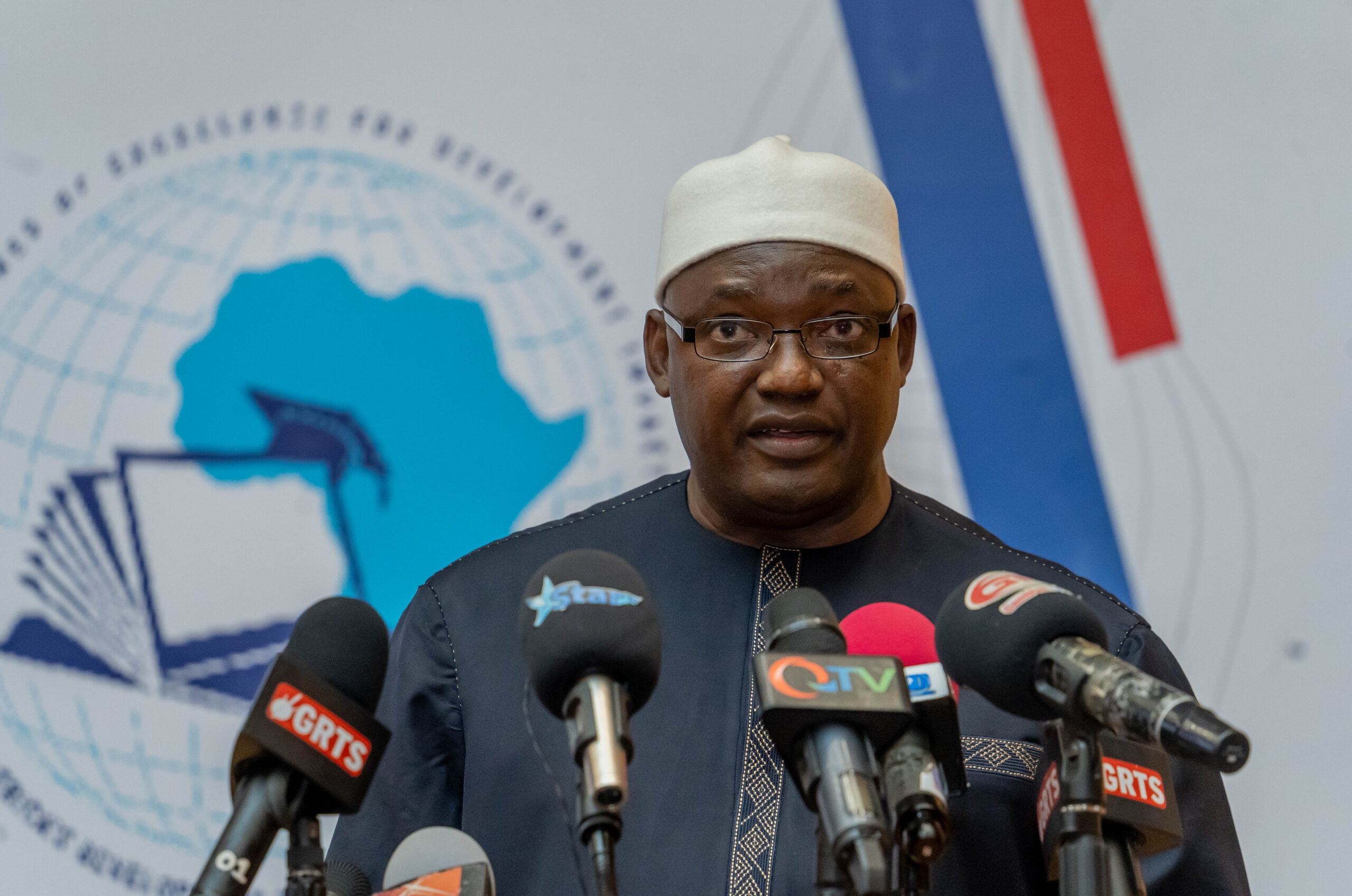President of the Republic of The Gambia joins stakeholders to celebrate project successes at the 8th ACE Impact Regional Workshop
The Sir Dawda Kairaba Jawara International Conference Center in the Gambia livened up on the 15th of November 2022 as the Gambia Police Band skillfully played the Gambian National Anthem to kickstart the 8th Africa Higher Education Centres of Excellence for Development Impact (ACE Impact) Regional Workshop.
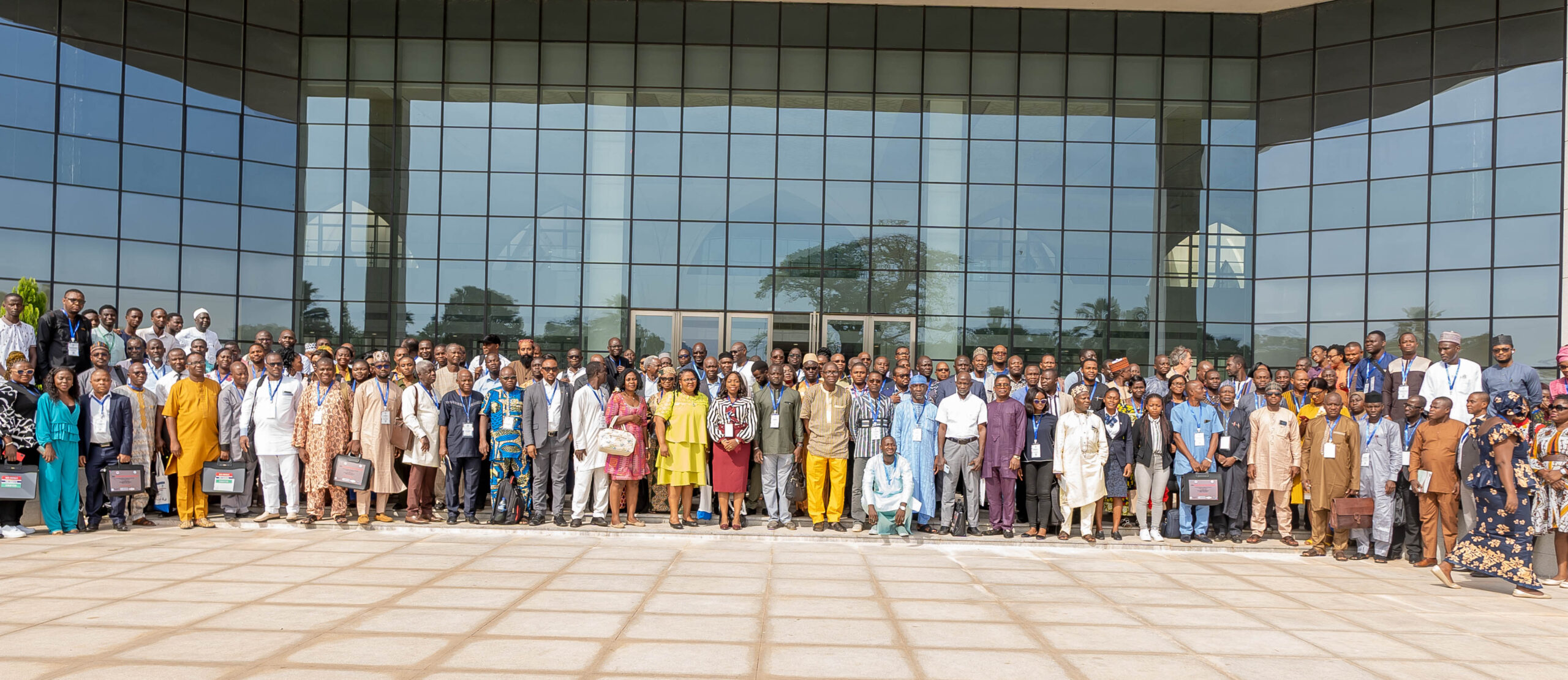 The opening ceremony was attended by prominent dignitaries including His Excellency, The Gambia President, Adama Barrow (who formally opened the regional workshop), Hon. Professor Pierre Gomez, the Gambia Minister of Higher Education, Research, Science & Technology; Hon. Professor Balde Moussa, Minister of Higher Education & Research of the Republic of Senegal; Hon. Karm Mamoudon, Minister of Higher Education and Research, Niger; Hon. Adama Diawara Minister of Higher Education and Scientific Research, Cote d’Ivoire; Hon. Badara Alieu Joof, Vice President of The Gambia; the Secretary General of the Association of African Universities Professor Olusola Bandele Oyewole; Mrs. Feyi Boroffice, the World Bank Resident Representative for The Gambia; Dr. Laurent Cortese, Deputy Director, French Development Agency (AFD) and several other high-ranking officials from the Republic of The Gambia.
The opening ceremony was attended by prominent dignitaries including His Excellency, The Gambia President, Adama Barrow (who formally opened the regional workshop), Hon. Professor Pierre Gomez, the Gambia Minister of Higher Education, Research, Science & Technology; Hon. Professor Balde Moussa, Minister of Higher Education & Research of the Republic of Senegal; Hon. Karm Mamoudon, Minister of Higher Education and Research, Niger; Hon. Adama Diawara Minister of Higher Education and Scientific Research, Cote d’Ivoire; Hon. Badara Alieu Joof, Vice President of The Gambia; the Secretary General of the Association of African Universities Professor Olusola Bandele Oyewole; Mrs. Feyi Boroffice, the World Bank Resident Representative for The Gambia; Dr. Laurent Cortese, Deputy Director, French Development Agency (AFD) and several other high-ranking officials from the Republic of The Gambia.
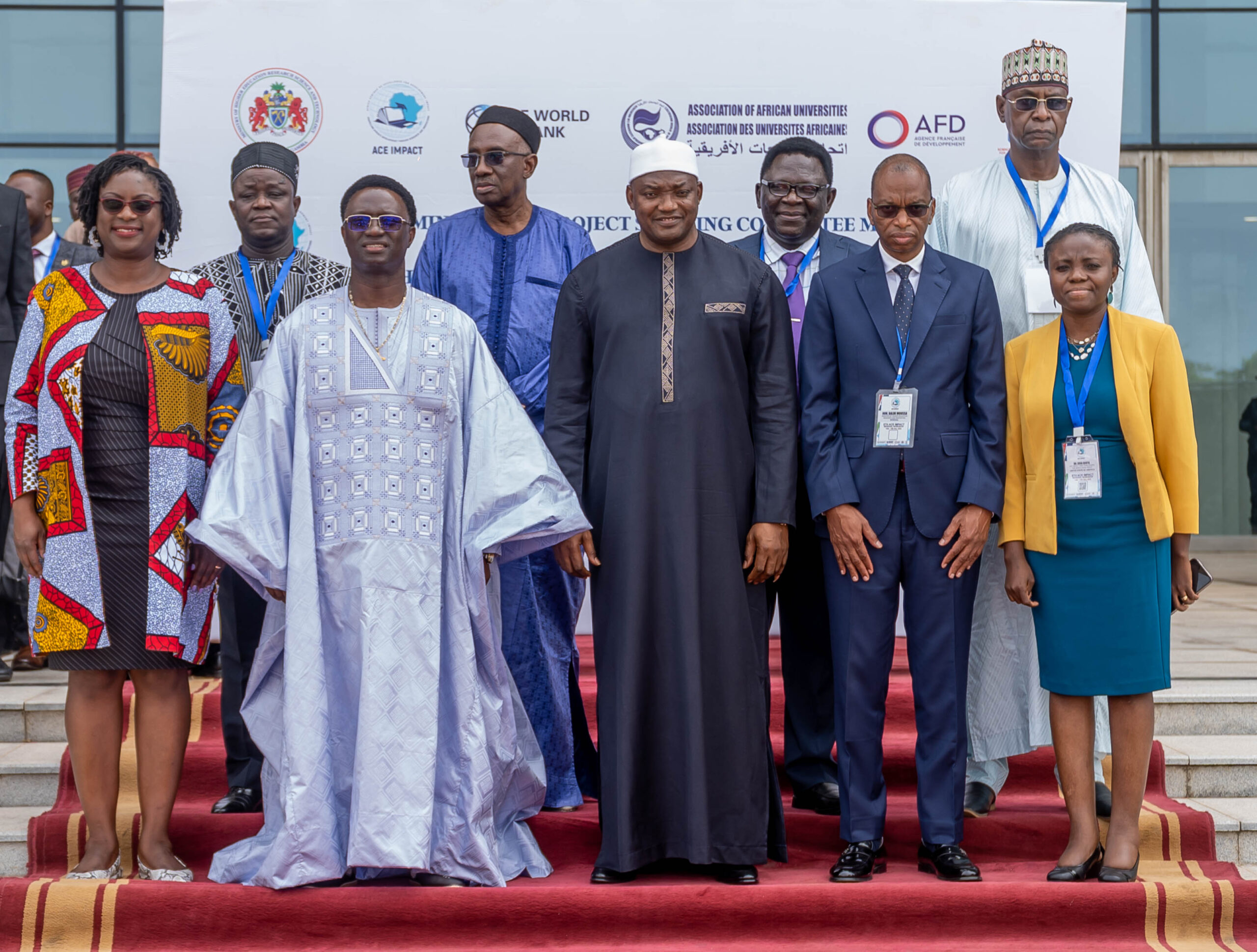 Dr. Yusupha Touray, the Permanent Secretary of The Gambia’s Ministry of Higher Education, Research, Science and Technology chaired the proceedings of the opening ceremony and welcomed the over 450 delegates to The Gambia – which is also nicknamed the ‘smiling coast’ because the country cuts through the middle of Senegal, with its position appearing like that of a smile on the map of the continent. The other distinguished delegates at this meeting included the Project’s Steering Committee Members, Focal Point Officers, Vice Chancellors, Center Leaders, Deputy Center Leaders, Procurement Officers, MEL Officers, Finance Officers, Environmental and Safeguard Officers, Subject Matter Experts, World Bank Officials, Students, AAU Officials, AFD Officials, and other invited guests.
Dr. Yusupha Touray, the Permanent Secretary of The Gambia’s Ministry of Higher Education, Research, Science and Technology chaired the proceedings of the opening ceremony and welcomed the over 450 delegates to The Gambia – which is also nicknamed the ‘smiling coast’ because the country cuts through the middle of Senegal, with its position appearing like that of a smile on the map of the continent. The other distinguished delegates at this meeting included the Project’s Steering Committee Members, Focal Point Officers, Vice Chancellors, Center Leaders, Deputy Center Leaders, Procurement Officers, MEL Officers, Finance Officers, Environmental and Safeguard Officers, Subject Matter Experts, World Bank Officials, Students, AAU Officials, AFD Officials, and other invited guests.
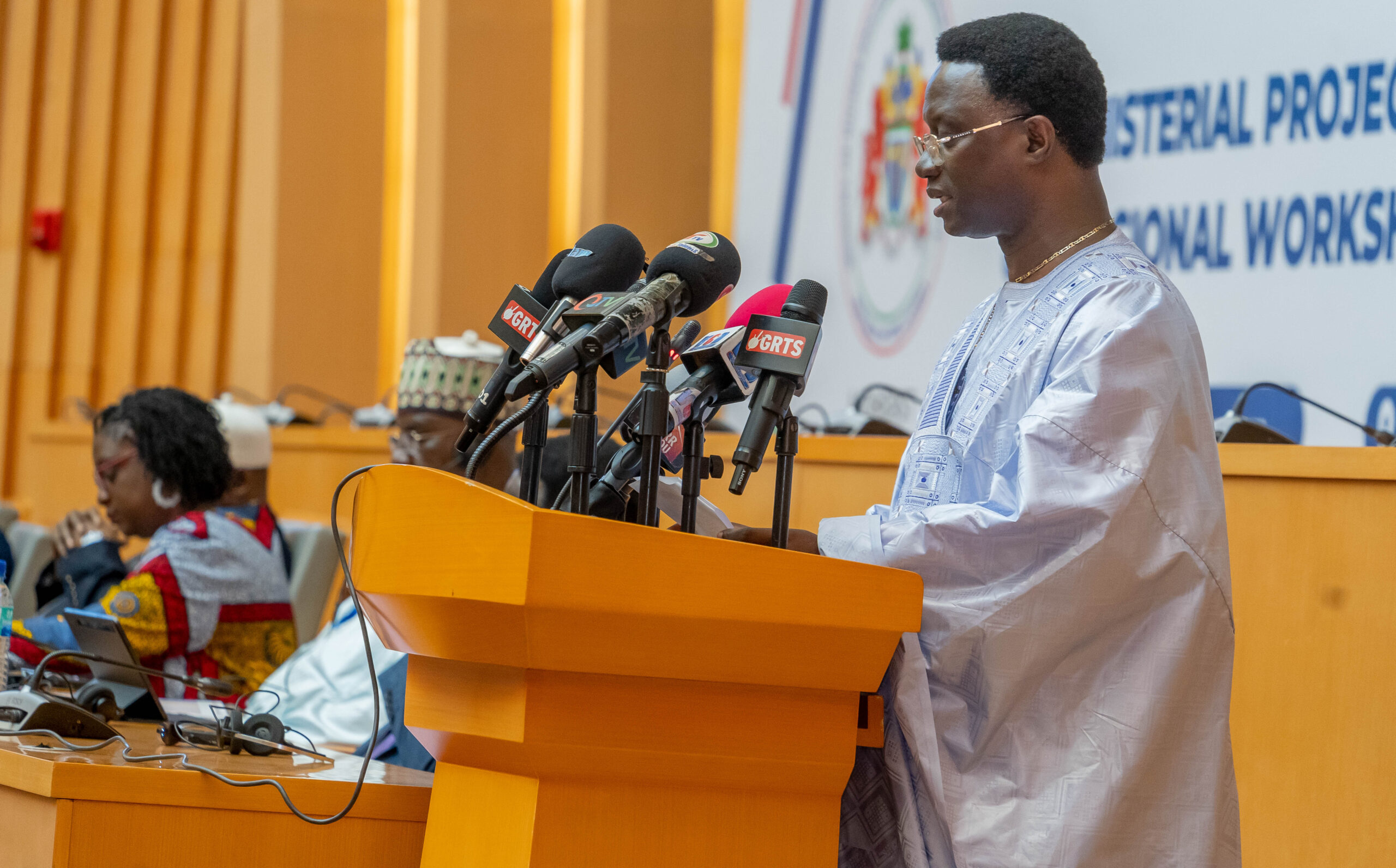 In his welcome remarks, Honourable Professor Pierre Gomez, the Minister of Higher Education, Research, Science & Technology for The Gambia, encouraged participants to take advantage of the 8th ACE Impact Regional Workshop and “establish the right partnerships and networks to help develop Africa’s Higher Education Institutions to be able to compete in the research and innovation global markets”. He acknowledged that The Gambia had benefited tremendously from being part of the Africa Higher Education Centres of Excellence Project – particularly in the areas of human capital development and institutional strengthening. He also said that he was inspired by the diversity of experts from academia and industry who are collaborating under the project to address developmental challenges through education and research.
In his welcome remarks, Honourable Professor Pierre Gomez, the Minister of Higher Education, Research, Science & Technology for The Gambia, encouraged participants to take advantage of the 8th ACE Impact Regional Workshop and “establish the right partnerships and networks to help develop Africa’s Higher Education Institutions to be able to compete in the research and innovation global markets”. He acknowledged that The Gambia had benefited tremendously from being part of the Africa Higher Education Centres of Excellence Project – particularly in the areas of human capital development and institutional strengthening. He also said that he was inspired by the diversity of experts from academia and industry who are collaborating under the project to address developmental challenges through education and research.
Workshop’s Focus on Innovation and Entrepreneurship – Message by the AAU
Professor Olusola Bandele Oyewole, the Secretary General of the Association of African Universities (AAU), reminded the gathering that the theme for the 8th regional workshop – Innovation and Entrepreneurship – was aptly chosen because of the need to reorient Africa’s education and training systems to meet the knowledge, competencies, skills, innovation, and creativity required to promote sustainable development at the national, sub-regional and continental levels. He reminded the participants that “modern and prosperous economies were spurred by innovation, entrepreneurship and technology” and that “innovation and entrepreneurship remain pressing priorities to maximize the potential of Africa’s most precious resource, its human capital”.
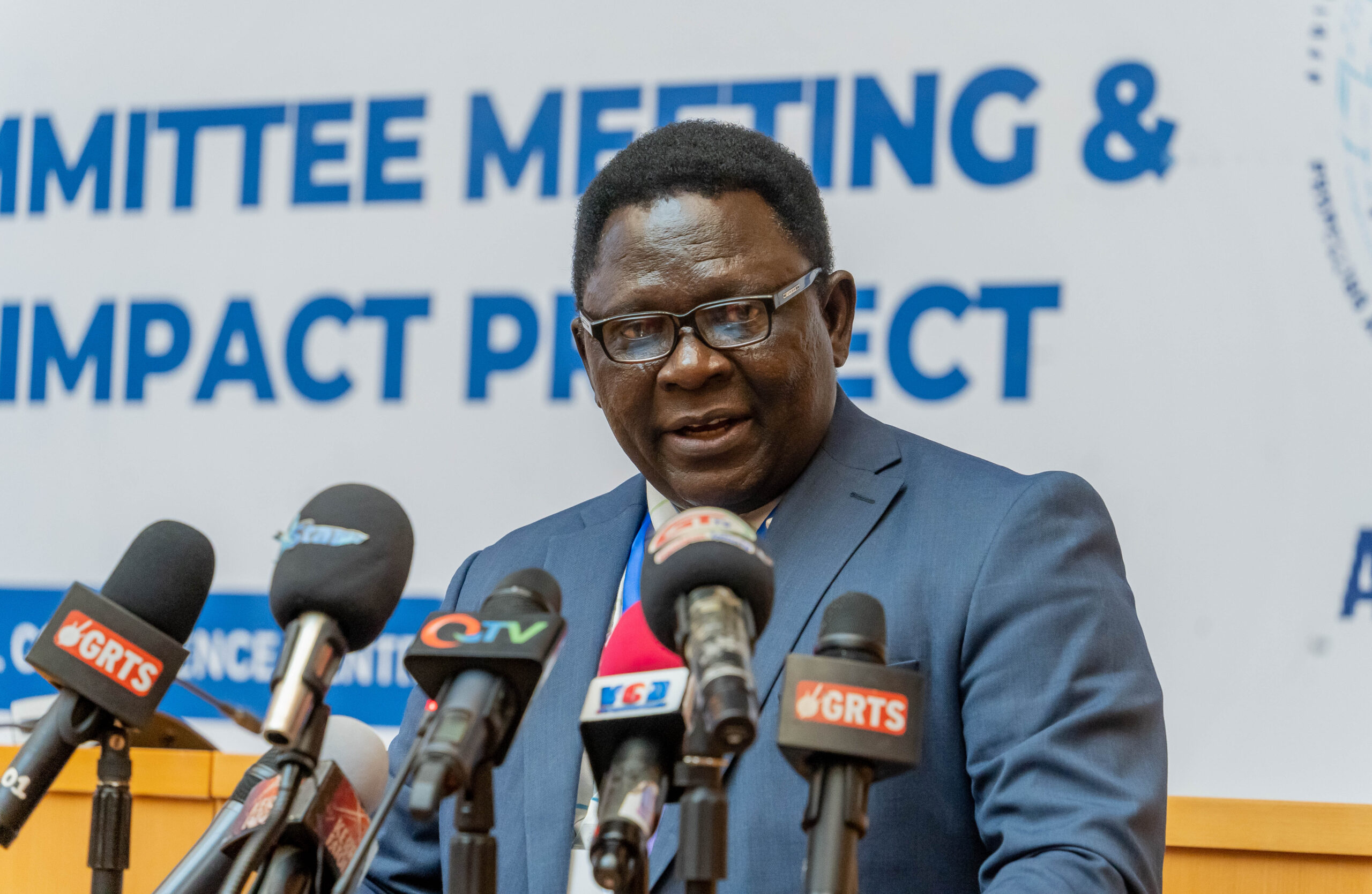 Professor Oyewole extended special gratitude to His Excellency Adama Barrow, President of the Republic of The Gambia, Hon. Professor Pierre Gomez, the Minister of Higher Education, Research, Science and Technology, and the Government of the Republic of The Gambia for hosting the 8th Regional Workshop and Project Steering Committee meeting. He also acknowledged the Republic of The Gambia for its support towards the development of African higher education through the ACE Impact project.
Professor Oyewole extended special gratitude to His Excellency Adama Barrow, President of the Republic of The Gambia, Hon. Professor Pierre Gomez, the Minister of Higher Education, Research, Science and Technology, and the Government of the Republic of The Gambia for hosting the 8th Regional Workshop and Project Steering Committee meeting. He also acknowledged the Republic of The Gambia for its support towards the development of African higher education through the ACE Impact project.
Commitment by the World Bank to Continue Prioritising Human Capital Development
Mrs. Feyi Boroffice, the World Bank Resident Representative for The Gambia pledged that the World Bank stood ready to support African governments and would continue to prioritize human capital development in Africa. She applauded the ACE Impact Centers for contributing towards improving maternal and child health in rural communities; leading genomic sequencing and diagnostics of infectious diseases such as Ebola and covid-19; developing high-yield, and climate and disease resistant crops; promoting valorization of waste and identifying innovative techniques to ensure the resilience of vulnerable coastal communities in Africa.
Again, Mrs. Boroffice thanked the French Development Agency (Agence Française de Développement – AFD), for co-financing the flagship ACE-Impact Project and paid a glowing tribute to the Association of African Universities’ team, led by Professor Olusola Oyewole and Dr. Sylvia Mkandawire (the ACE Impact Senior Project Manager) for working tirelessly in planning and co-hosting the 8th ACE Impact Regional Workshop. She stated that the ACE Impact Project was “a great model for leveraging regional approaches promoting a quality, innovative, sustainable, and collaborative higher education sector in Africa, and for complementing national efforts”.
Key initiatives being implemented to Transform The Gambia’s Higher Education Sector
His Excellency Adama Barrow, the President of The Gambia, highlighted the various concerted efforts that The Gambia was investing in transforming its higher education system through reforms to put the youth at the forefront of national development. He also shared that The Gambia was working towards establishing a fully-fledged Centre of Excellence in Science, Technology, and Engineering for Entrepreneurship. “The recently established University of Applied Science, Engineering and Technology (USET) is going to be important for developing adequate human capital that is equipped with entrepreneurial mindsets to match Gambia’s development strides and aspirations” said President Barrow.
The President also intimated that his government, through the Ministry of Higher Education, Research, Science and Technology, was setting up regional skills centres and the relevant curriculum for technical education and training. He added, that besides strengthening the existing tertiary institutions, his government was committed to expanding opportunities in the Applied Sciences at the new University of Applied Sciences, Engineering, and Technology.
As a proud member state of the ECOWAS (Economic Community of West African States), the President expressed the country’s delight in hosting, partnering, and participating in the 8th ACE Impact Regional Workshop. He agreed that it was important to build the capacities of African Universities to enable them bridge the critical human resource capacity gaps and contribute towards addressing the continent’s development challenges. The President emphasized that the “academics, researchers, and policymakers, could pave the way for a better Africa if higher education was regarded as an investment”.
He concluded by thanking the World Bank, the Association of African Universities, the French Development Agency, and the Project Steering Committee of the ACE Impact Project for supporting The Gambia in creating a “new national development path within its education sector”.
The ACE Impact Project Steering Committee Meeting
The opening ceremony of the 8th ACE Impact Regional Workshop was preceded by a Project Steering Committee Meeting on the 14th of November 2022 where the African Ministers of Higher Education or their representatives were in attendance to receive reports on the status of the project. In her ACE Impact Progress and Update report to the PSC Meeting, Dr. Sylvia Mkandawire discussed key results of the project in line with the project development objectives. Among the key achievements, it was highlighted that US$6.196.916 external revenue had been mobilized by the ACE Impact Centers; 5,341 regional students had been admitted by the Centers; 5,460 females make up 51% of the total number of students enrolled and 152 academic programmes had been nationally accredited. In the area of partnerships, it was reported that the ACE Impact Project was in a partnership with IBM and are supporting Student Internships at IBM’s research laboratories in Kenya and South Africa, as well as providing advanced digital training for faculty. The project was also said to engage Elsevier in building the Centers’ capacities in research, publications, and scientific communication. Another ongoing partnership with AFD is helping to support four (4) thematic networks of ACE Centers, with 6 million Euros being invested in the networks. The PASET (partnership for skills in applied science, engineering, and technology) collaboration, which was also highlighted, involves 200 students who are hosted in ACE Impact accredited programs.
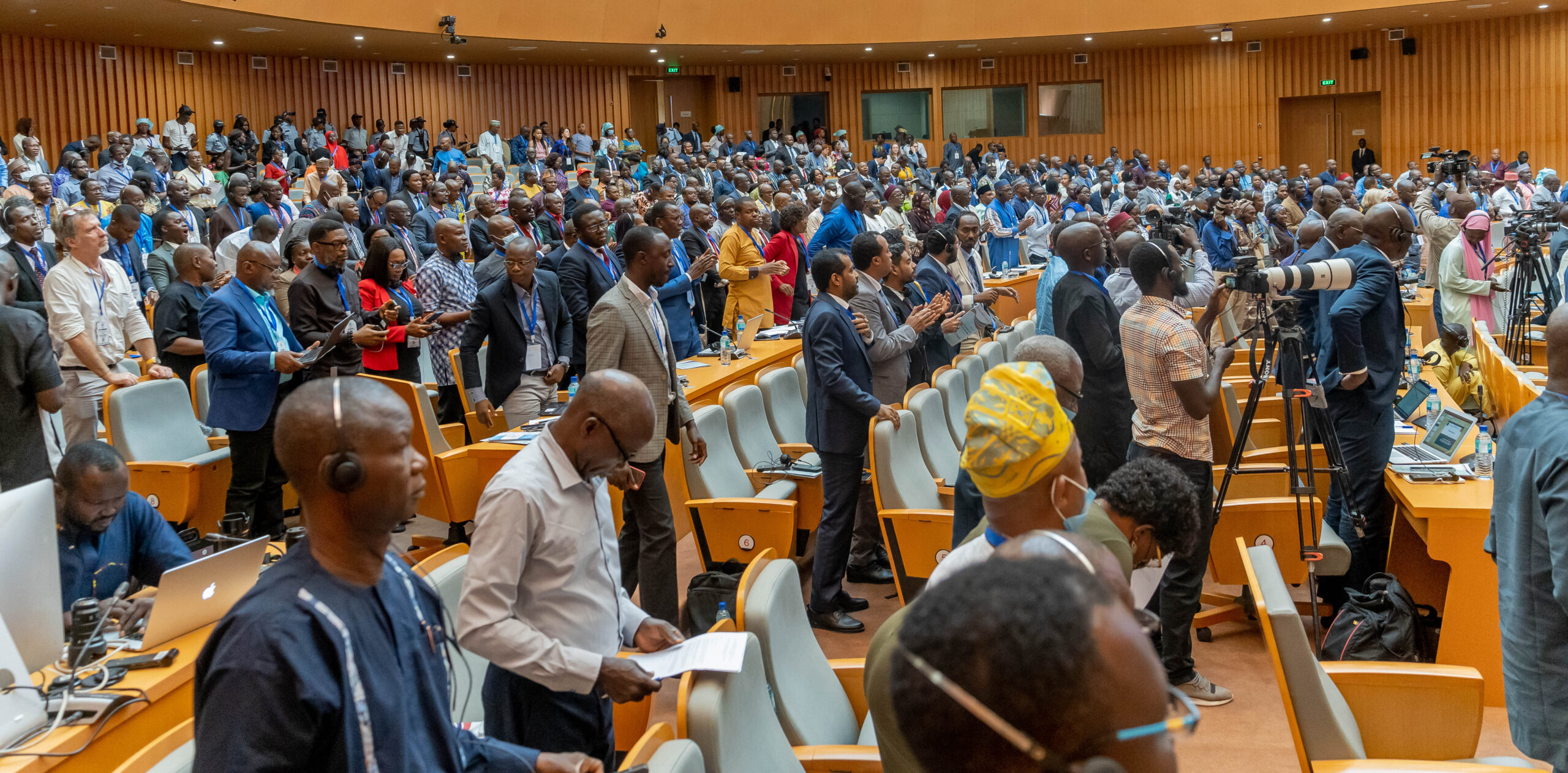
Call to Action to Promote Sustainability of the ACE Impact Project
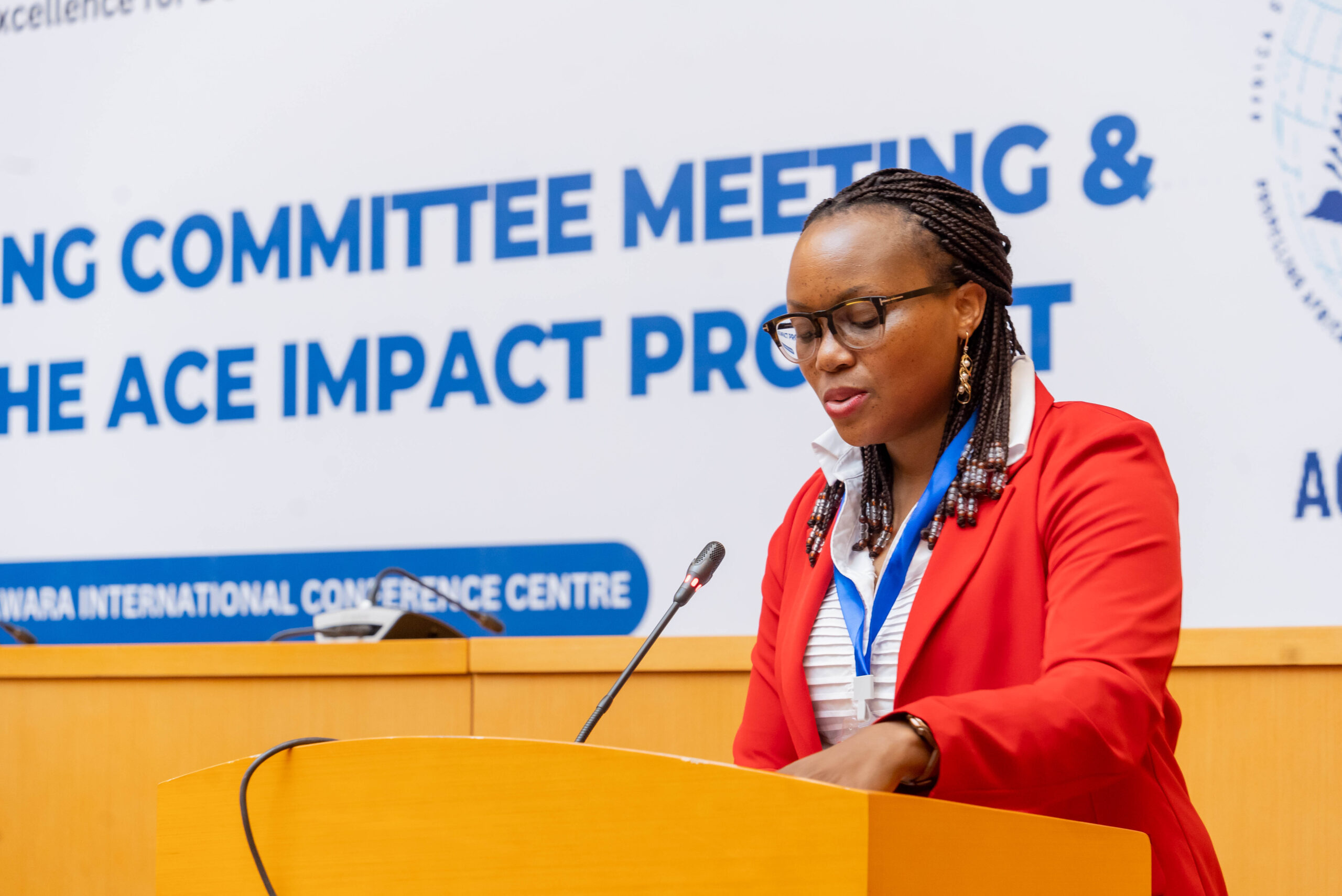 Dr. Mkandawire concluded her report with a call to action for African governments to urgently support the project in the areas of procurement, investments in state-of-the-art infrastructure and sustaining the investments already made. She also reported on the high-level meeting hosted for the ACE Impact Centers and key partners at the World Bank Offices in Washington DC in October 2022. She indicated that the meeting was successful in disseminating the impact of the ACEs and their contributions towards addressing key regional development challenges and global crises in public health, climate change, energy, agriculture, and food.
Dr. Mkandawire concluded her report with a call to action for African governments to urgently support the project in the areas of procurement, investments in state-of-the-art infrastructure and sustaining the investments already made. She also reported on the high-level meeting hosted for the ACE Impact Centers and key partners at the World Bank Offices in Washington DC in October 2022. She indicated that the meeting was successful in disseminating the impact of the ACEs and their contributions towards addressing key regional development challenges and global crises in public health, climate change, energy, agriculture, and food.
